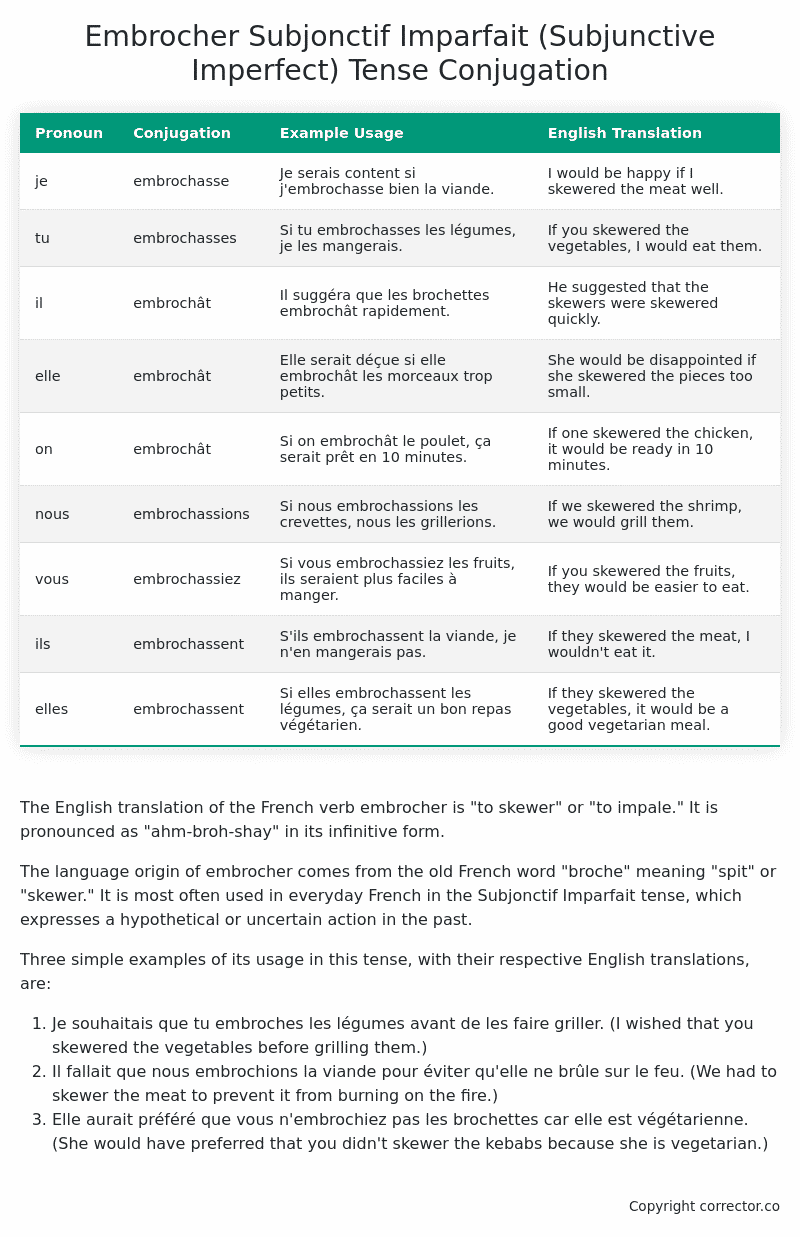Subjonctif Imparfait (Subjunctive Imperfect) Tense Conjugation of the French Verb embrocher
Introduction to the verb embrocher
The English translation of the French verb embrocher is “to skewer” or “to impale.” It is pronounced as “ahm-broh-shay” in its infinitive form.
The language origin of embrocher comes from the old French word “broche” meaning “spit” or “skewer.” It is most often used in everyday French in the Subjonctif Imparfait tense, which expresses a hypothetical or uncertain action in the past.
Three simple examples of its usage in this tense, with their respective English translations, are:
- Je souhaitais que tu embroches les légumes avant de les faire griller. (I wished that you skewered the vegetables before grilling them.)
- Il fallait que nous embrochions la viande pour éviter qu’elle ne brûle sur le feu. (We had to skewer the meat to prevent it from burning on the fire.)
- Elle aurait préféré que vous n’embrochiez pas les brochettes car elle est végétarienne. (She would have preferred that you didn’t skewer the kebabs because she is vegetarian.)
Table of the Subjonctif Imparfait (Subjunctive Imperfect) Tense Conjugation of embrocher
| Pronoun | Conjugation | Example Usage | English Translation |
|---|---|---|---|
| je | embrochasse | Je serais content si j’embrochasse bien la viande. | I would be happy if I skewered the meat well. |
| tu | embrochasses | Si tu embrochasses les légumes, je les mangerais. | If you skewered the vegetables, I would eat them. |
| il | embrochât | Il suggéra que les brochettes embrochât rapidement. | He suggested that the skewers were skewered quickly. |
| elle | embrochât | Elle serait déçue si elle embrochât les morceaux trop petits. | She would be disappointed if she skewered the pieces too small. |
| on | embrochât | Si on embrochât le poulet, ça serait prêt en 10 minutes. | If one skewered the chicken, it would be ready in 10 minutes. |
| nous | embrochassions | Si nous embrochassions les crevettes, nous les grillerions. | If we skewered the shrimp, we would grill them. |
| vous | embrochassiez | Si vous embrochassiez les fruits, ils seraient plus faciles à manger. | If you skewered the fruits, they would be easier to eat. |
| ils | embrochassent | S’ils embrochassent la viande, je n’en mangerais pas. | If they skewered the meat, I wouldn’t eat it. |
| elles | embrochassent | Si elles embrochassent les légumes, ça serait un bon repas végétarien. | If they skewered the vegetables, it would be a good vegetarian meal. |
Other Conjugations for Embrocher.
Le Present (Present Tense) Conjugation of the French Verb embrocher
Imparfait (Imperfect) Tense Conjugation of the French Verb embrocher
Passé Simple (Simple Past) Tense Conjugation of the French Verb embrocher
Passé Composé (Present Perfect) Tense Conjugation of the French Verb embrocher
Futur Simple (Simple Future) Tense Conjugation of the French Verb embrocher
Futur Proche (Near Future) Tense Conjugation of the French Verb embrocher
Plus-que-parfait (Pluperfect) Tense Conjugation of the French Verb embrocher
Passé Antérieur (Past Anterior) Tense Conjugation of the French Verb embrocher
Futur Antérieur (Future Anterior) Tense Conjugation of the French Verb embrocher
Subjonctif Présent (Subjunctive Present) Tense Conjugation of the French Verb embrocher
Subjonctif Passé (Subjunctive Past) Tense Conjugation of the French Verb embrocher
Subjonctif Imparfait (Subjunctive Imperfect) Tense Conjugation of the French Verb embrocher (this article)
Subjonctif Plus-que-parfait (Subjunctive Pluperfect) Tense Conjugation of the French Verb embrocher
Conditionnel Présent (Conditional Present) Tense Conjugation of the French Verb embrocher
Conditionnel Passé (Conditional Past) Tense Conjugation of the French Verb embrocher
L’impératif Présent (Imperative Present) Tense Conjugation of the French Verb embrocher
L’infinitif Présent (Infinitive Present) Tense Conjugation of the French Verb embrocher
Struggling with French verbs or the language in general? Why not use our free French Grammar Checker – no registration required!
Get a FREE Download Study Sheet of this Conjugation 🔥
Simply right click the image below, click “save image” and get your free reference for the embrocher Subjonctif Imparfait tense conjugation!

Embrocher – About the French Subjonctif Imparfait (Subjunctive Imperfect) Tense
Formation
Common Everyday Usage Patterns
Interactions with Other Tenses
Subjonctif Présent
Indicatif Passé Composé
Conditional
Conditional Perfect
Summary
I hope you enjoyed this article on the verb embrocher. Still in a learning mood? Check out another TOTALLY random French verb conjugation!


